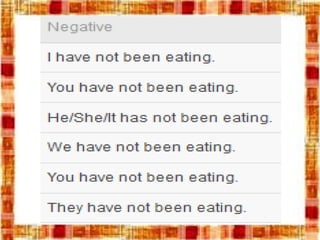Este documento explica los usos del pasado perfecto continuo, presente perfecto continuo y futuro perfecto continuo en inglés. Describe cómo se forman estas construcciones verbales, incluyendo oraciones afirmativas, negativas e interrogativas. También proporciona ejemplos para ilustrar cómo se usan estas formas verbales para hablar de acciones en curso o que comenzaron en el pasado y continúan en el presente o futuro.




![Negative Sentences
+ HAD + NOT + BEEN + Verb. (ing) + C
● I had not been studying English long when I went to
London.
● Lindsay hadn't been working at the store for long
when it closed.
● They had not [hadn't] been traveling long before they
had their first problem.](https://image.slidesharecdn.com/sesion5-150108215951-conversion-gate02/85/Sesion5-Pasado-perfecto-continuo-5-320.jpg)






















